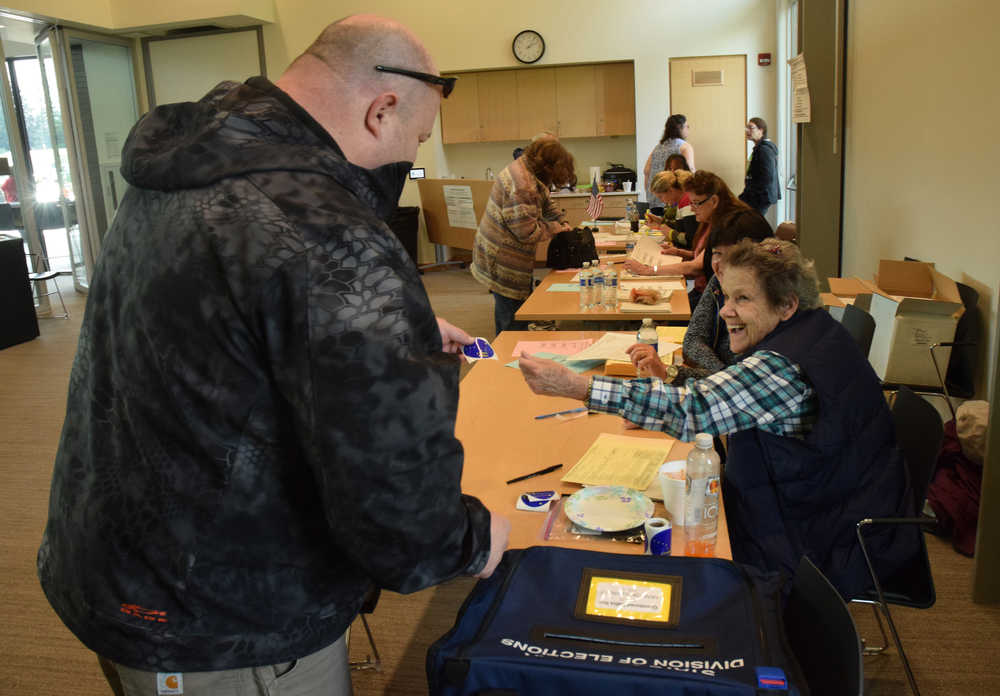Juneau voters might disagree about politics, but on Tuesday, they seemed to agree about one thing: Turnout at this year’s statewide primary stunk.
By 10 p.m., incomplete official figures from the Alaska Division of Elections indicated as few as 1 in 5 Juneau voters participated in the election.
Low turnout or not, the results on the statewide level appear clear: Democrat Steve Lindbeck will face Republican Don Young and Libertarian Jim McDermott for U.S. House in November. For the U.S. Senate, Lisa Murkowski will represent the Republicans and Cean Stevens the Libertarians. Ray Metcalfe appeared to be the Democratic nominee in early voting.
Tuesday’s tally will rise as mailed and questioned ballots are counted, but even with those late arrivals, this year’s turnout will go into the books as one of the lowest — if not the lowest — since the century began.
“It’s a little quieter this year,” said Andrea Watts, the election chairperson for the Lynn Canal precinct, which votes at the Juneau Ferry Terminal.
Lynn Canal is the most politically active precinct in Juneau: Two years ago, 45.38 percent of its registered voters cast ballots at the polls, the most of any precinct in the capital borough. Two years before that, turnout was 34.51 percent — again, the highest in Juneau.
By 6 p.m., counters on the precinct’s voting machines showed only 205 ballots cast in person — 16.4 percent of the area’s 1,250 registered voters.
“We’re usually 30 (percent), and now we’re barely 10 (percent),” Watts said before calculating the turnout.
Across town at the Douglas Public Library, Stuart Sliter called Tuesday’s turnout “the lowest I’ve ever seen.”
Sliter (pronounced sly-turr) has been chairwoman of the Douglas precinct for the past 20 years and has worked in various positions for the Division of Elections since 1984.
At 3:16 p.m., the library’s voting machine had registered 123 in-person votes — about 7.3 percent of the precinct’s registered voters.
“People just don’t seem to care,” Sliter said.
With no ballot measures and all of Juneau’s statehouse seats uncontested in the primary (Cathy Muñoz and Justin Parish will face each other in November’s general election), statewide U.S. House and U.S. Senate races offered the only options for competition on Juneau ballots.
Two years ago, Ballot Measure 1 — a question about whether or not to change Alaska’s oil taxes — drew tens of millions of dollars in campaign spending. That, in turn, brought voters to the polls both for and against the measure.
With nothing like that on this year’s ballot, “Here, there’s nothing very exciting,” Sliter said.
With no significant electoral advertising, there was less of a push to vote.
“Some people said they haven’t seen much publicity,” said Mark Johnson, deputy precinct chairman for North Douglas.
His precinct was voting at Juneau’s downtown fire station. At 1:10 p.m., just 82 people had cast votes in person, a turnout of 5.4 percent.
“We’re all lonely down here,” offered one of Johnson’s fellow election workers, joking about the low turnout.
Earlier this summer, Republican presidential candidate Donald Trump suggested that American elections could be rigged this fall.
“Nov. 8, we’d better be careful, because that election is going to be rigged,” he said at an Aug. 1 rally in Columbus, Ohio. “People are going to walk in and they’re going to vote 10 times, maybe, who knows?”
No Juneau voters stepped forward to say that his thoughts were a likely deterrent, but many did say they were disgusted with their choices nationally and statewide.
Melanie Zahasky, leaving the Auke Bay polling station, offered a simple explanation for Tuesday’s low turnout.
“I think people are lazy and they don’t think it’ll make a difference,” she said.
She added that she doesn’t believe that, which is why she took the time to vote.
“If we don’t get out and vote, then it won’t make a difference,” she said.
—
Read more election news:
Tuesday’s election results promise at least seven new faces in Legislature

